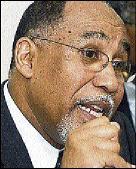Mark Titus, Gleaner Writer

J. Paul Morgan of the Office of Utlities Regulation may need more powers.
Considered 'a celebrated case' for its achievements in the telecommunications sector, Jamaica has recorded over US$1.2 billion ($84 billion) in capital investment since the sector was liberalised six years ago, said regulator J. Paul Morgan, director general of the Offices of Utilities Regulation.
The office would not commment on who were the biggest investors - big spenders would have included companies like Digicel, which dominated the cellular market almost on entry, and Flow Communications, which is reshaping the cable and broadband markets. Flow, only last month, revealed that its investments top $14 billion to date, with plans to spend another $15 billion to $21 billion over three years.
David Hall, chief executive officer of digicel Jamaica, told Wednesday Business the company has pumped US$750 million into its operations here.
"From a monopoly situation in 2000, we now boast three established and entrenched mobile providers and one major fixed-line provider, which now faces emerging competition from a number of quarters," said Morgan Monday.
That reference was to Cable & Wireless Jamaica, whose monopoly was broken at the turn of the decade, leading to a wave of investments.
"Add to this the emergence of such offerings as facilities hosting, wireless broad band, mobile virtual network operations and you will see a picture of a robust, modern, dynamic and expanding telecommunications sector (in Jamaica) that rivals that of any other developing, or even developed country," he advised participants of the fifth Commonwealth Telecommuncations Organisation (CTO) forum under way at the Ritz-Carlton Rose Hall.
The conference is attended by more than 100 representatives from 34 countries, including the Caribbean, the United States and from within the continents of Europe, Africa and Asia.
Karlene Francis, director general in the Ministry of Energy, Mining and Telecommunications, said the evolution of NGN would create a number of regulatory challenges, saying for example that digital broadcasting now required Government to act expeditiously to rectify overlapping jurisdiction in the areas of policy formulation and the legal framework.
"The change in ICT technologies, markets and services have created a number of challenges for the government," said Francis.
"Firstly, the convergence of the telecommunications, radio commu-nications, and the broadcasting industries has resulted in the need for the government to rationalise the number of regulatory institutions."
Regulators, she added, needed to be imbued with additional powers as well as the tools to manage a sector that is constantly growing as new investors enter the market.
The CTO is an international development partnership between Commonwealth and non-Com-monwealth governments, business and civil society organisations.
It provides the international community with effective means to help bridge the digital divide and achieve social and economic development by delivering to developing countries unique knowledge-sharing programmes in the use of ICT in the specific areas of telecommunications, IT, broadcasting and the Internet.
business@gleanerjm.com

